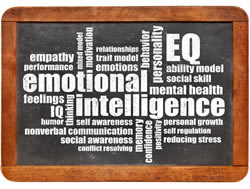Travis Bradberry* explains how mental strength comes out of emotional intelligence, a quality that can be attained and developed for those willing to try.
 We all reach critical points in our lives where our mental strength is tested.
We all reach critical points in our lives where our mental strength is tested.
It might be a toxic friend or colleague, a dead-end job, or a struggling relationship.
Whatever the challenge, you have to see things through a new lens, and take decisive action.
It sounds easy, but it isn’t.
It’s fascinating how mentally strong people set themselves apart.
Where others see impenetrable barriers, they see challenges to overcome.
Too many people succumb to the mistaken belief that mental strength comes from natural, unteachable traits.
In reality, mental strength is under your control, and it’s a matter of emotional intelligence (EQ).
Decades of research point to EQ being the critical factor that sets star performers apart from the rest.
The connection is so strong that 90 per cent of top performers have high EQ.
Despite the significance of EQ, its intangible nature makes it very difficult to know how much you have and what you can do to improve it.
I’ve analysed the data from the million-plus people TalentSmart has tested in order to identify the behaviour that is the hallmark of a high EQ.
If you’re up for it, start with these critical things that emotionally intelligent people are careful to avoid.
They don’t stay in their comfort zone:
Self-awareness is the foundation of EQ, and increasing your self-awareness isn’t comfortable.
You can’t increase your EQ without pushing yourself to discover what you need to work on and what you should be doing differently.
It’s more comfortable to keep the blinkers, but they make certain that you’ll never have a high EQ.
They don’t give in to fear:
They say that bravery is being scared to death to do something and doing it anyway.
Many times, that’s true, even when it comes to your career.
The fear doesn’t have to come from something as extreme as rushing into a burning building; it can be a fear of public speaking or trying for a promotion.
If you use fear as an excuse not to do something, you’ve already lost.
They don’t stop believing in themselves:
Emotionally intelligent people persevere.
They’re focused on their goals, not on momentary feelings, and that keeps them going even when things are hard.
They don’t take failing to mean that they’re a failure.
Likewise, they don’t let the opinions of others keep them from chasing their dreams.
They don’t beg for attention:
People who are always begging for attention are needy.
They rely on that attention to form their self-identity.
Emotionally intelligent people couldn’t care less about attention.
They do what they want to do and what needs to be done, regardless of whether anyone is stroking their ego.
They don’t act like jerks:
People who act like jerks are unhappy and insecure.
They don’t have the emotional strength to be nice when they don’t feel like it.
Emotionally intelligent people place high value on their relationships, which means they treat everyone with respect, regardless of their mood.
They don’t hold grudges:
The negative emotions that come with holding a grudge are actually a stress response.
Holding onto that stress wreaks havoc on your body and can have health consequences over time.
Holding a grudge means you’re holding onto stress, and emotionally intelligent people know to avoid this at all costs.
They don’t hang around negative people:
Negative people are bad news because they wallow in their problems and fail to focus on solutions.
They want people to join their pity party so that they can feel better about themselves.
People often feel pressure to listen to negative people because they don’t want to be seen as callous or rude.
There’s a fine line between lending a sympathetic ear to someone and getting sucked into their negative emotional spiral.
Emotionally intelligent people set limits and distance themselves from negative people when necessary.
They don’t feel sorry for themselves:
The worst thing about feeling sorry for yourself is that it shifts your locus of control outside yourself.
Feeling sorry for yourself is, in essence, declaring that you’re a helpless victim of circumstance.
Emotionally intelligent people never feel sorry for themselves because that would mean giving up their power.
They don’t feel entitled:
Emotionally intelligent people believe the only things they deserve are those they earn.
People who lack EQ think the world owes them something.
Emotionally intelligent people know they alone are responsible for their successes or failures.
They don’t close their minds:
When people close their minds to new information or opinions, it’s typically because they find them threatening.
Emotionally intelligent people aren’t threatened by new things; they’re open to new information and new ideas, even if it means admitting they are wrong.
They don’t let anyone limit their joy:
When your sense of pleasure and satisfaction are derived from comparing yourself with others, you are no longer the master of your happiness.
When emotionally intelligent people feel good about something they’ve done, they don’t let anyone’s opinions or accomplishments take that away from them.
While it’s impossible to turn off your reactions to what others think of you, you don’t have to compare yourself with others, and you can always take people’s opinions with a grain of salt.
They don’t get eaten up by jealousy and envy:
Emotionally intelligent people understand the happiness and success of others doesn’t take away from their own
They see success as being in unlimited supply, so they can celebrate others’ successes.
*Travis Bradberry is the co-founder of TalentSmart, a provider of emotional intelligence tests, emotional intelligence training, and emotional intelligence certification. He can be contacted at TalentSmart.com.
This article first appeared on the TalentSmart website.











